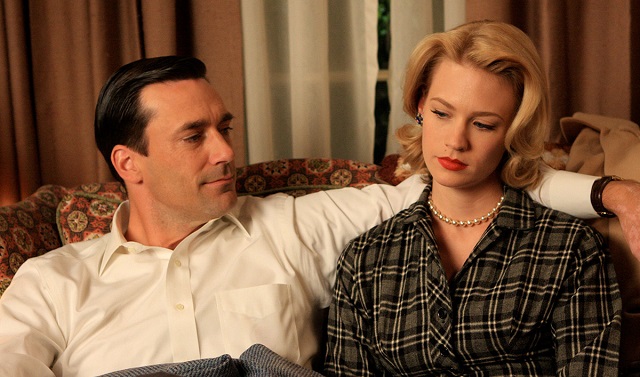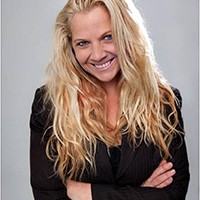
Warning: Naughty language ahead!
~
~
I only ever dated shitty men.
I was never attracted to kind, loving, available men. It was always the emotionally unavailable ones—the ones who were never there for me, who inevitably put me down, led me astray, cheated on me, spent my money, and abandoned me.
The ones who didn’t love or value me, but wouldn’t let me leave, so I’d go back to them over and over and over. I’d end up in the worst kind of depression, feeling like I was losing my mind, going around and around in circles, no matter how much they hurt me.
I knew it wasn’t my fault. They were, obviously, just assholes.
So I blamed them.
I blamed them for their mistreatment, their lies, their betrayal, their bad habits, their constant inability to be there for me when I knew that being there for someone was definitely a thing a boyfriend should do. It made me furious and frustrated as hell because it was Just Not Fair!
Then I would spiral down into helplessness as it became clear that this was how it always was for me—there was no way I could ever break the cycle.
So I blamed myself.
I blamed myself for being pathetic, for going back again, for being the kind of woman men couldn’t respect or love. I blamed myself for that thing that was inherently flawed and unworthy and unlovable about me. This led me into hopelessness, shame, and self-loathing.
That’s when depression happened. Its arrival was invariably marked by drinking problems, self-harm, and snorting cocaine at home alone at 9 a.m. to make the hurt go away. I would lose control, push people away, jeopardize my work, and eventually create such a mess of my life that I would bail on the city I was living in, move somewhere else, and start the whole cycle again.
Until I tried something else.
After a self-imposed period of celibacy and some deep spiritual work, I found another way. I asked myself: Why am I attracted to shitty men, or rather, how do I co-create their shittiness?
I’d seen these men commit to and love and even marry other women after we’d broken up, so I must have been contributing to the dynamic in some way. From this place of open, curious inquiry—without self-flagellation—the answer came:
I attracted exactly what I believed I was worth.
I then asked myself: What can I learn from this situation? Well first, I learned the importance of self-love and self-respect.
I learned that I had a problem with drinking and drugs that was not serving me, and that I was avoiding feeling the painful things that ultimately held the key to my freedom. I learned about my abandonment issues, and the unhealed childhood traumas I was still carrying around and perpetuating.
The final question I asked myself was: How can I improve my life and break these cycles? I gave up drinking and drugs. I lost weight and improved my physical health. I experimented with different practices for spiritual connection and healing. I read books on topics that interested and educated me, and I changed my profession to one that nourishes me and gives me a feeling of purpose.
I finally took responsibility.
Blaming others sounds like this: What an asshole. I can’t believe he did that. I am the victim here.
Blaming yourself sounds like this: I’m so useless; this is all my fault. I brought this on myself. I am fundamentally flawed.
But taking responsibility sounds like this:
How did this happen?
What can I learn?
How can I improve my life?
How can I find meaning in this?
Can I use these lessons to help others?
Where is my opportunity for growth?
Taking responsibility does not mean you absolve other parties of their contributions, or that you relieve anyone else of their own responsibility in a situation. If you have been in an abusive relationship, taking responsibility does not absolve your abuser in any way.
But when you place your focus on what you can change (Hint: that’s your own life and your own future), you become empowered. You can do something. You can move forward.
You are no longer stuck.
Now, I’m crazy about loving and respectful men who treat me well and are equally crazy about me. I’m largely free of the depression and addiction issues that haunted my 20s, and grateful for all the destructive relationships which ultimately led to my healing.
But don’t take my word for it!
~
~
Author: Larissa Wright
Image: “Mad Men”
Editor: Nicole Cameron
Copy Editor: Callie Rushton
Ready to join?
Hey, thanks so much for reading! Elephant offers 1 article every month for free.
If you want more, grab a subscription for unlimited reads for $5/year (normally, it's $108/year, and the discount ends soon).
And clearly you appreciate mindfulness with a sense of humor and integrity! Why not join the Elephant community, become an Elephriend?
Your investment will help Elephant Journal invest in our editors and writers who promote your values to create the change you want to see in your world!
Already have an account? Log in.
Ready to join?
Hey, thanks so much for reading! Elephant offers 1 article every month for free.
If you want more, grab a subscription for unlimited reads for $5/year (normally, it's $108/year, and the discount ends soon).
And clearly you appreciate mindfulness with a sense of humor and integrity! Why not join the Elephant community, become an Elephriend?
Your investment will help Elephant Journal invest in our editors and writers who promote your values to create the change you want to see in your world!
Already have an account? Log in.
 Share on bsky
Share on bsky





Read 0 comments and reply